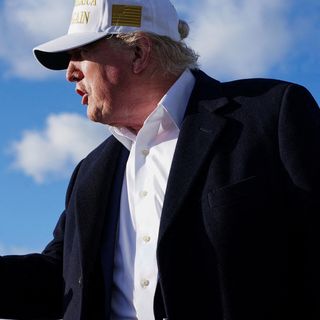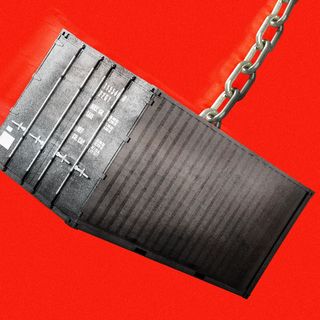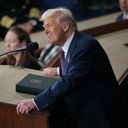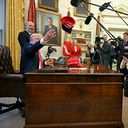Wake-up call: Leadership in the AI age
I've spoken with scores of CEOs and hundreds of students in recent weeks. They agree on one big thing: There's growing confusion about what constitutes strong, smart leadership in the transition to an AI world.
Why it matters: We run two companies (Axios + Axios HQ), oversee 500+ employees and spend an inordinate amount of time talking with the architects of the leading AI companies. So I wanted to share how we're approaching leadership in this volatile, hinge moment.
The big picture: America is facing the biggest, fastest, most consequential technological shift in history — at the very moment people have lost faith in the big institutions. Making matters worse, most of us feel exhausted before contemplating super-human intelligence — which is often so unimaginable or scary that it's easier to ignore than engage. Many are jamming their heads in the sand instead of exploring this new frontier.
- The result: a stunning lack of preparedness for a technology that could hit every person, every job, every company over the next year or so.
- Yes, AI might never match the hype. But we're betting it approximates the hype in the next 18 months to three years. And so are most CEOs and top government officials we talk to, even if they're strangely silent about it in public.
More than ever, it's strong, smart, high-integrity leaders, especially CEOs and heads of organizations big and small, who can provide a vital service to employees and the broader public as AI hits land.
- Here are a few ways we are trying to do this at Axios:
- Be blunt: Stop downplaying the tectonic shifts that could hit every job, starting next year. Employees need the hard truth that entire classes of jobs could be wiped away, especially if people don't quickly adapt. I recently told the Axios staff that we're done sugar-coating it, and see an urgent need for every employee to turn AI into a force multiplier for their specific work. We then gave them tools to test. My exact words to a small group of our finance, legal and talent colleagues last week: "You are committing career suicide if you're not aggressively experimenting with AI."
- Prepare people: We provided our entire staff with access to the advanced Open AI ChatGPT model, and asked for volunteers to find ways to improve productivity in every job here. They then pass what they learned to colleagues doing the same work. Shockingly, nearly half our staff volunteered. Almost every person is doing personal experimentation. This gives everyone a chance to adapt to AI before better versions upend their craft. Free versions of ChatGPT, Claude, Perplexity, Grok and other models are a great place to start. We tell most staff they should be spending 10% or more of their day using AI to discover ways to double their performance by the end of the year. Some, like coders, should shoot for 10x-ing productivity as AI improves.
- Prepare yourself: AI is both tantalizing and terrifying. It's our job as leaders to realize this, and sharpen our own thinking and explanations about how this will affect organizations and the people who rely on us. This is a moment to over-communicate, even if we admit the uncertainty and unknowns ahead. Government is doing little to raise awareness, so it's on us to explain what's coming. We can at least detail how we're handling early preparations and setting boundaries for how, when and why we'll use AI.
- Be clear-eyed: We believe many businesses will be destroyed by AI. But many will be born or made bigger and better. It's our job to get ahead of the change and leverage AI to make our companies stronger, more profitable and more enjoyable. World-changing companies will be built with just a few people. Miracle cures will be discovered by creative, persistent people who figure out how to conjure magic out of the models. Massive fortunes will be made — with tools that are basically free. Yes, much of what will happen is worrisome now, and soon will be scary. But some will master the tools, instead of vice versa. That could be you. At Axios, we see AI helping us vastly expand our local news coverage. So we're working feverishly to use the emerging tech to grow this business.
- Be leaders: So many have lost confidence in so many institutions. Don't expect the government or the AI companies to step in to restore faith at this volatile time. Truth is, government officials won't regulate or prepare the public because they see this as a race against China for global dominance. That's a valid, if incomplete, thesis. Plus, most politicians don't want to warn people of possible job losses, even if they anticipate them coming. The AI companies are focused more on speed to market than societal consequences. That's their fiduciary obligation to shareholders. So it's up to other leaders, especially CEOs, to make this transition safer and smoother. That takes wisdom, honesty, candor, smarts — and some empathy for nervous workers.
- Simplify: You'll hear a lot more from us on this topic in the year ahead. The pace of change in all jobs and all sectors will soon hit hyperspeed. The winners will be those who can simplify their business, purpose, structure, systems and work to adapt fast and smartly. One simple start to simplicity: Make sure every person at every level can name — in order of importance — the three things they must do to crush their job. Then, make sure you agree! Then, push them on how AI can help them with those three most important things.
The bottom line: Experiment assuming the current glitches — usually hallucinations or incorrect answers — will be fixed as models improve. These glitches keep us from currently using AI much beyond experimentation and augmentation.
- But we work under the assumption that one day soon the models will operate at a human-efficacy level for many tasks.





















